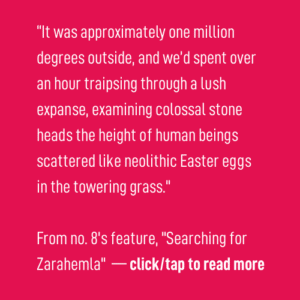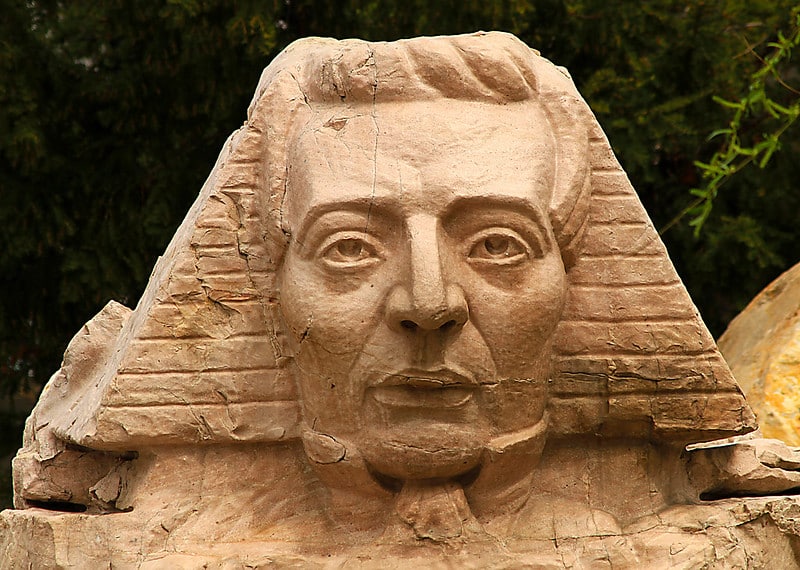Samuel Cheney
no. 8, The Road Trip Issue
Autumn 2022
We Had a Time of Year Called Summer
Two thousand miles away
from the mountain
above my childhood
our days are filled
by flood I wake and boil
water for coffee then walk
out back and start to bail
rain that’s come overnight
and filled the holes I dug
to catch the rain before
it fills our basement I get
the submersible pump
going empty
the rain barrel
that fills beneath our gutter
I sweat and work shirtless
and am thick and gritty
when I finally sit down
with my coffee on the floor
to keep the furniture clean
two weeks ago driving
thru south New Jersey corn
sprouting right there
we had to pull off
the highway the rain
too high coming down
too abundant to see
the next day
sleeping on the beach
on a perfect morning
of white sand and Xanax
I had to sprint
into Acme to hide
out from the rain it came
on like an air raid like
annoying Beethoven it
was in your face
drown your pets kind
of rain I checked
the price of Diet Coke
I considered the hero
sandwiches I might
bring another day
to the beach
I played the lottery
and stood dripping
with my Diet Coke reading
the front page
of the Times above
the fold was a photo
a landscape that looked just
like my great-grandma’s
dusty county or the place
we’d drive summers to play
weeklong tourneys sage
sprouting right there
on the warning track
“It’s Just Brutal”
read the subhead
in my face
it was Oakley, Utah
if you could summit
the mountain above
my childhood
home you could see it
from there it was
that close we had made
the front page we were
droughting that bad
in 1850 Parley P. Pratt
rode up the Weber River
from this point he returned
to Brigham Young
and reported “abundant
grass and plenty of
water” where the Utes
would harvest roots
of the sego lily
sprouting right there
to store and eat the bulbs
through winter
they taught this
to the Mormon settlers
who would later call
themselves “bulb eaters”
as a point of pride
what saved them
wasn’t requited
this was Oakley
I was reading about
the phrase scientists
used was “megadrought”
the rain was coming down
my face so abundant
I had to suck it
from my mustache
to keep from dripping
onto the paper
I wasn’t buying my hands
too damp to hold it
when the sky stopped
I walked back
to the Chalfonte
the lush lawn swimming
below feet of clear
ripples rolling up
to the historic boards
of the hotel porch
it was starting
to be surrounded
by fire trucks

Sphinx with the Head of the Prophet Joseph Smith
I stand at his face and get dizzy.
Vertiginous eyes. The warmth inside my parka
leaking at the edges. The world
clangs out over the wall, cranes and saws squealing
to box this garden in, to shrink it.
I stand at his face and blink, swaying in breeze
carrying salt off the lake, my movement moving
his stone gaze. Spurs of frost-dust cling
to butterfly bushes’ deadheaded stalks. Wing lights
wink over the mountains to the east. He had seen
all this—who never lived to see any of it.
These cracked lips that whispered open the sky
and brought Heaven down to the earth.
Here. The compass of stars
engraved above his heart is true. It points away.
I put my freezing hand to the sandstone,
to the cell bars of his ribs.
A swaddled family strolls up, mutters cheese

and has their picture taken with the martyred sphinx.
I set my fingers into the rift
in his cheek, the hole in his forehead.
I awaited the seer, while they slumbered and slept
carved into quartzite at my feet. I shiver
in the daylit cold till my digits slow. Nothing moves
but the dirt being shot into the air
from the conveyor, humming along
over the white-feathered plywood wall.
Somewhere up in the highest floors
of the new parking structure, a worker’s hammer
meets and meets a stake. Joseph’s
face brightens. Two sister missionaries
wait politely behind me.
“Sphinx with the Head of the Prophet Joseph Smith” was originally published in Peripheries, the literary journal of Harvard Divinity School’s Center for the Study of World Religions, and is reprinted here with permission of the author.
Samuel Cheney is from Centerville, Utah. His poems appear in The American Journal of Poetry, Copper Nickel, The Literary Review, The Missouri Review, Peripheries, Salmagundi, and elsewhere. He has been awarded a 2021 Pushcart Prize, the 2018 Erskine J. Poetry Prize, and scholarships from Bread Loaf, the Sewanee Writers’ Conference, and the State of Utah.

More great reading
from Pipe Wrench no. 8
Searching for Zarahemla
Journalist Emily Kaplan recounts an epic Mormon road trip across Mesoamerica. How many ways are there to tell a story? And how do we know what’s true?
The Traditions of the Fathers
Anthropologist Catie Nuckols-Wilde’s casts a critical eye at Mormon archeological scholarship and its impact on how the West sees Mesoamerica.
Guilt Trip
Columnist Soraya Roberts rethinks travel, for the common good. Worried about climate change? Back away from the check-in desk.

